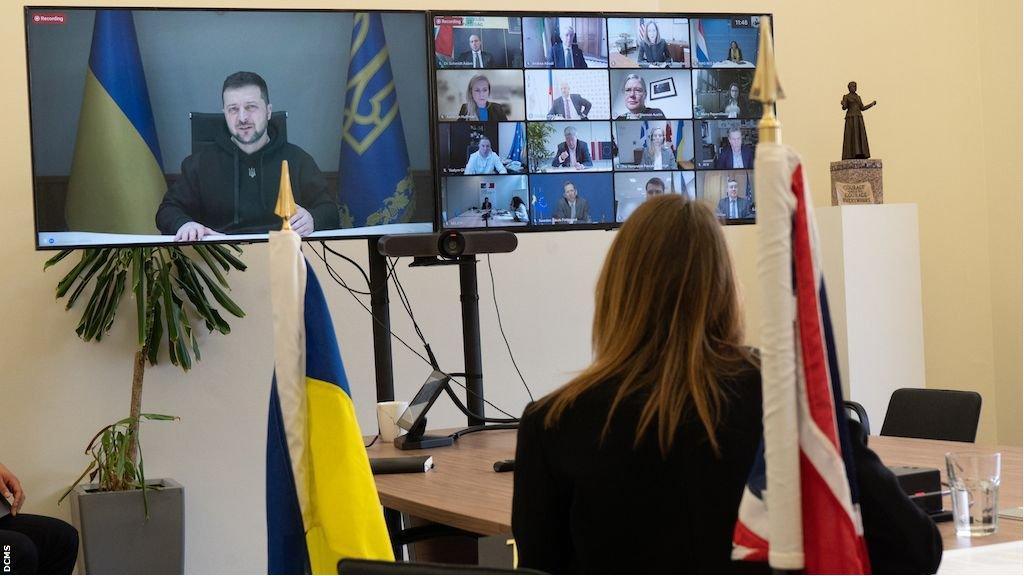Paris Olympics 2024: Russian participation 'can't be covered up by white flag' - Ukraine president
- Published

Volodymyr Zelensky spoke to the summit via live video link
Russian participation in the Paris 2024 Olympics "cannot be covered up with pretend neutrality or a white flag", Ukraine president Volodymr Zelensky says.
Zelensky was speaking at a summit of 36 nations on Friday to discuss Russian and Belarusian athletes' participation in next year's Games.
The summit was chaired by UK Culture Secretary Lucy Frazer.
A collective statement is expected to be agreed in the coming days.
The summit was called after the International Olympic Committee (IOC) said it was "exploring a pathway" for athletes from the two nations to compete as neutrals.
That move has been criticised amid Russia's ongoing invasion of Ukraine.
Speaking via live video link, Zelensky told the delegation: "While Russia kills and terrorises, representatives of the terrorist state have no place at sports and Olympic competitions.
"And it cannot be covered up with some pretended neutrality or a white flag, because Russia is now a country that stains everything with blood - even the white flag.
"It must be recognised. And this must be recognised, in particular, at the level of the International Olympic Committee."
Russian sports minister Oleg Matytsin said calls to ban their athletes from the Olympics were unacceptable.
In his opening address, Zelensky told the delegation - which included ministers and senior representatives from countries including France, Germany, Poland, the United States and Canada - that 228 Ukrainian athletes and coaches had died since Russia's invasion in February 2022.
He called for the Olympic movement to be "safeguarded", noting that "many Russian athletes are associated with the sports clubs of the Russian army and security state agencies".
"If the Olympic sports were killings and missile strikes, then you know which national team would occupy the first place," he said.
He later added: "If, God forbid, the Olympic principles are destroyed and Russian athletes are allowed to participate in any competitions or the Olympic Games, it's just a matter of time before the terrorist state forces them to play along with the war propaganda."
In January, the IOC suggested Russian and Belarusian athletes could compete under neutral flags in Paris, saying "no athlete should be prevented from competing just because of their passport".
Ukraine's sports minister Vadym Guttsait has said the country could boycott the Olympics if Russian and Belarusian athletes are allowed to compete.
A large number of other nations have already voiced their opposition to the potential inclusion of Russian and Belarusian athletes.
"Now we see an undisguised desire to destroy the unity of international sports and the international Olympic movement, to make sport a means of pressure to resolve political issues," Russian minister Matytsin told state news agency Tass.
"This is a direct interference of ministers in the activities of independent international sports organisations, an attempt to dictate the conditions for the participation of athletes in international competitions, which is absolutely unacceptable."
On Thursday, the IOC urged Ukraine to drop threats of boycotting the Games in Paris.
In a letter to Guttsait, which has been seen by the BBC, IOC president Thomas Bach said comments from Ukrainian officials suggesting allowing Russian and Belarusian athletes would promote the war are "defamatory".
"Russia has destroyed Ukrainian sporting infrastructure and stopped opportunities for Ukrainian athletes," Frazer told the summit.
"There is danger here that the world wishes to move on and back to business as usual. However, the situation in Ukraine has not changed since the IOC's initial decision last February on banning Russian and Belarusian athletes from competition.
"As long as Putin continues his war, Russia and Belarus must not be allowed to compete on the world stage or be represented at the Olympics."